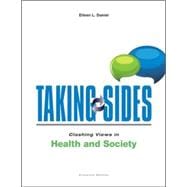
Table of Contents Clashing Views in Health and Society, Eleventh Edition Unit: The Health Care Industry
Unit: Health and Society
Unit: Mind-Body Relationship
Unit: Sexuality and Gender Issues
Unit: Public Health Issues
Unit: Consumer Health
|
Table of Contents Clashing Views in Health and Society, Eleventh Edition Unit: The Health Care Industry
Unit: Health and Society
Unit: Mind-Body Relationship
Unit: Sexuality and Gender Issues
Unit: Public Health Issues
|